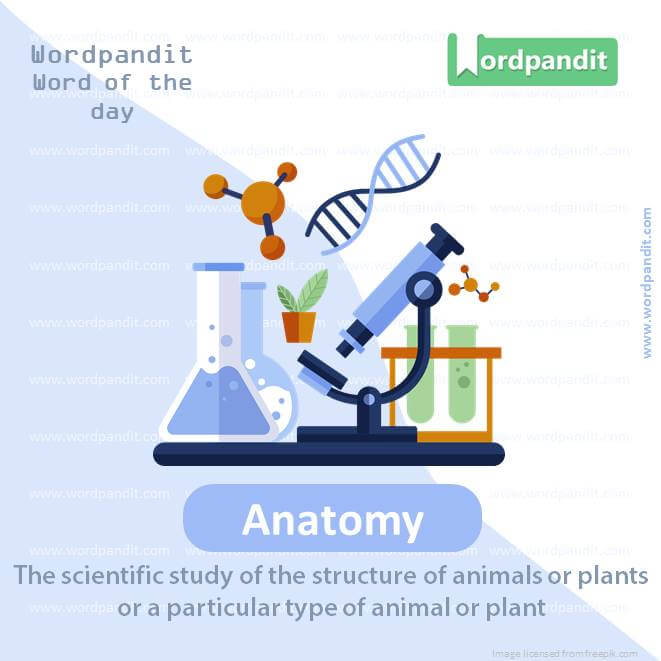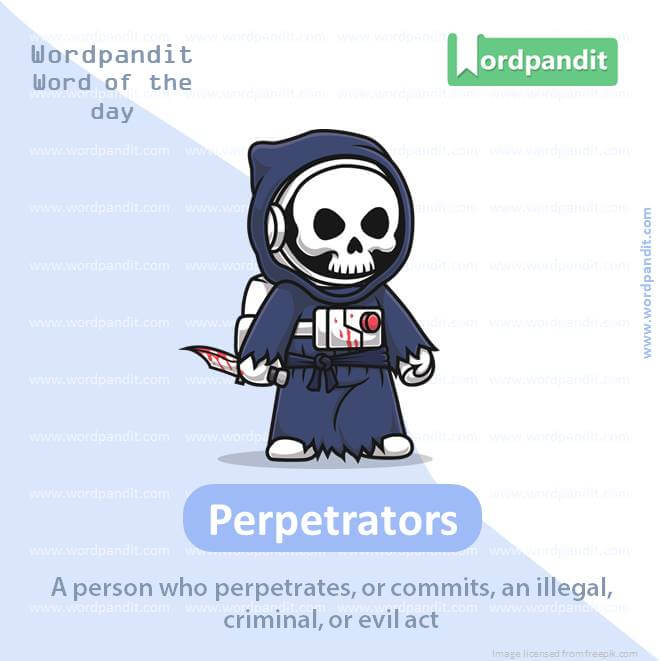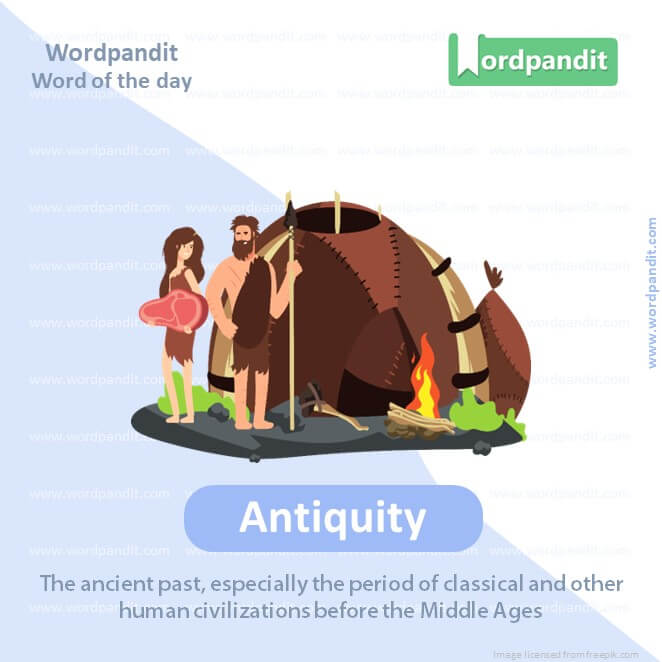Daily Vocabulary Words: List of Daily Used Words
Hi there. Welcome to this special section @ Wordpandit.
Our endeavour here is straightforward: highlighting important daily vocabulary words, you would encounter in The Hindu. This is your repository of commonly used words; essentially, we are posting a list of daily used words. Hence, this has significant practical application as it teaches you words that are commonly used in a leading publication such as The Hindu.
Visit the website daily to learn words from The Hindu.

WORD-1: ANATOMY
CONTEXT: Medical students spend years studying human anatomy to gain a comprehensive understanding of the body’s structure and functions.
SOURCE: The Hindu
EXPLANATORY PARAGRAPH: Imagine your favorite toy or doll. Now think about all the different parts it has – like its arms, legs, and head. Our bodies have parts too, and anatomy is like a big map that shows where each part goes and what it’s called.
MEANING: The scientific study of the structure of animals or plants or a particular type of animal or plant (noun).
PRONUNCIATION: Uh-NAH-tuh-mee
SYNONYMS: Structure, physique, form, framework, makeup
USAGE EXAMPLE:
1. Doctors study human anatomy to know where all our parts are.
2. The anatomy of a bird allows it to fly.
3. She’s learning about plant anatomy in school.
4. The anatomy of the machine was complex.
WORD-2: DEMOLISHED
CONTEXT: The historical monument was demolished to make way for a new shopping mall, leading to public outrage.
SOURCE: The Hindu
EXPLANATORY PARAGRAPH: Imagine building a tower with blocks, and then knocking it down. When something is demolished, it’s like that tower being knocked down and broken apart.
MEANING: Completely destroyed or torn down. (verb).
PRONUNCIATION: Deh-MOL-ishd
SYNONYMS: Destroyed, razed, wrecked, ruined, obliterated
USAGE EXAMPLE:
1. The old building was demolished to make space for a park.
2. She demolished the cake in minutes.
3. The hurricane demolished several homes.
4. The team demolished their opponents in the game.

WORD-3: NADIR
CONTEXT: After a series of failed ventures, the business hit its nadir, leading the owner to reconsider his strategy.
SOURCE: The Hindu
EXPLANATORY PARAGRAPH: Imagine you’re playing on a swing. At the highest point, you feel on top of the world! But when you swing back down, that lowest point is called the nadir. It’s like the opposite of being on top.
MEANING: The lowest point in the fortunes of a person or organization (noun).
PRONUNCIATION: NAY-deer
SYNONYMS: Bottom, low point, trough, depth, rock bottom
USAGE EXAMPLE:
1. Losing his job was the nadir of his year.
2. The team’s performance reached its nadir during the match.
3. After the nadir of his career, he began to climb back up.
4. The river was at its nadir during the drought.

WORD-4: PERPETRATOR
CONTEXT: The authorities were determined to bring the perpetrator of the heinous crime to justice.
SOURCE: The Hindu
EXPLANATORY PARAGRAPH: Think about when someone does something they’re not supposed to, like taking a cookie without asking. The person who did it, the one who took the cookie, is called the perpetrator.
MEANING: A person who perpetrates, or commits, an illegal, criminal, or evil act (noun).
PRONUNCIATION: Per-PEH-tray-tor
SYNONYMS: Offender, criminal, wrongdoer, culprit, malefactor
USAGE EXAMPLE:
1. The police caught the perpetrator of the crime.
2. The security cameras identified the perpetrator.
3. She was the main perpetrator behind the prank.
4. The search for the perpetrator continued for weeks.
WORD-5: CESSPOOL
CONTEXT: The old neighborhood was notorious for its open cesspools which posed a health risk to residents.
SOURCE: The Hindu
EXPLANATORY PARAGRAPH: Think about a big, yucky puddle where all the dirty water and waste go. That’s a cesspool. It’s a place we don’t want to play in because it’s filled with stuff we want to stay away from.
MEANING: A deep hole or container in the ground for waste, or a place full of bad things. (noun).
PRONUNCIATION: SESS-pool
SYNONYMS: Sewer, pit, sump, dump, mire
USAGE EXAMPLE:
1. The old house had a cesspool in the backyard.
2. The city’s alleyways became a cesspool of crime.
3. They decided to clean the cesspool before it overflowed.
4. This website has become a cesspool of negative comments.

WORD-6: ANTIQUITY
CONTEXT: The ruins were a testament to the city’s great antiquity, and historians from all over the world came to study its remnants.
SOURCE: The Hindu
EXPLANATORY PARAGRAPH: Imagine something very, very old like a treasure from a pirate’s chest. Antiquity means something that is super old and from a long, long time ago.
MEANING: The ancient past, especially the period of classical and other human civilizations before the Middle Ages (noun).
PRONUNCIATION: AnTIKwuhtee
SYNONYMS: Ancientness, oldness, age, relic, artifact
USAGE EXAMPLE:
1. The museum displayed items of great antiquity.
2. Rome is a city rich in antiquity.
3. She bought a vase of great antiquity at the auction.
4. The artifact dates back to the antiquity of the region.
WORD-7: CULPABLE
CONTEXT: The company was deemed culpable for environmental damages due to its negligence.
SOURCE: The Hindu
EXPLANATORY PARAGRAPH: Let’s say you accidentally break a toy. If someone says you’re culpable, it means you’re the one responsible for the toy being broken.
MEANING: Deserving blame for a wrong action. (adjective).
PRONUNCIATION: KULpuhbul
SYNONYMS: Guilty, blameworthy, responsible, accountable, at fault
USAGE EXAMPLE:
1. He was found culpable for the accident.
2. The jury decided if she was culpable for the crime.
3. They looked for evidence to prove he was culpable.
4. After investigation, three employees were deemed culpable.
WORD-8: SUO MOTU
CONTEXT: The council decided to reduce the fees suo motu, a decision that was warmly received by the residents.
SOURCE: The Hindu
EXPLANATORY PARAGRAPH: Imagine a superhero deciding to help people without anyone asking them. “Suo motu” is a fancy way to say someone did something on their own without anyone else telling them to.
MEANING: On one’s own initiative, without any prompt or request. (adverb).
PRONUNCIATION: SOOoh MOHtoo
SYNONYMS: Voluntarily, on one’s own, of one’s own accord, spontaneously, independently
USAGE EXAMPLE:
1. The judge took the case suo motu after reading the news.
2. The committee acted suo motu without waiting for complaints.
3. He donated money suo motu without being asked.
4. The agency started the investigation suo motu.
WORD-9: PREDOMINANTLY
CONTEXT: The art exhibit was predominantly filled with modern pieces, reflecting the recent trend in the art world.
SOURCE: The Hindu
EXPLANATORY PARAGRAPH: Imagine you have a big box of crayons, but most of the crayons are blue. That means blue is the main color you see more than any other color. “Predominantly” is a fancy word that means “mostly” or “mainly.”
MEANING: Mostly or mainly; for the most part. (adverb).
PRONUNCIATION: PreedohMINantlee
SYNONYMS: Mainly, largely, chiefly, primarily, mostly
USAGE EXAMPLE:
1. The team was predominantly made up of young players.
2. The region is predominantly desert.
3. Her wardrobe is predominantly blue and white.
4. The film festival was predominantly focused on indie films.

WORD-10: REGIME
CONTEXT: Under the new regime, several reforms were introduced to improve the lives of citizens.
SOURCE: The Hindu
EXPLANATORY PARAGRAPH: Imagine a group of people who make the rules in a game and decide how everything works. In a country or place, a regime is like that group of people who decide the rules and are in charge.
MEANING: A system or ordered way of doing things; a government, especially an authoritarian one (noun).
PRONUNCIATION: RehJEEM
SYNONYMS: System, administration, government, rule, management
USAGE EXAMPLE:
1. The new regime promised better healthcare for all.
2. Many hope for a change in the current regime.
3. The dietary regime helped her achieve better health.
4. The company adopted a new regime to improve efficiency.













